Putin’s punch is coming!
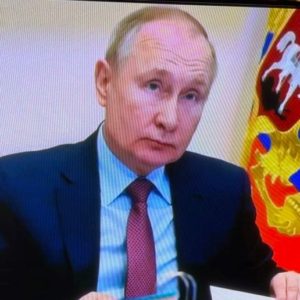
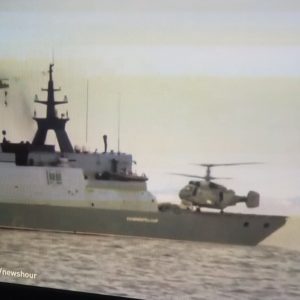
RUSSIAN PRESIDENT Vladimir Putin told the nation on April 25, 2005, that the “demise of the Soviet Union was the greatest geopolitical catastrophe of the century.”
“It became a genuine tragedy for the Russian people,” he said. He lamented, saying “Tens of millions of our fellow citizens and countrymen found themselves beyond the fringes of Russian territory.”
“The epidemic of collapse has spilled over to Russia itself,” he said, referring to separatist movements such as those in Chechnya.
Putin began his political career when he was appointed head of the International Committee at the St. Petersburg Mayor’s Office in June 1991. He was involved in attracting foreign investments to the city economy. He also worked in establishing and maintaining cooperation with foreign partners and supervising the creation and opening of joint ventures.
Then the Union of Soviet Socialist Republics – USSR – collapsed on December 25, 1991. To the former KGB officer, it was time to reflect. As it turned out, the leaders of three of the USSR’s founding and largest Republics had declared that the Soviet Union no longer existed, and 11 more republics had also joined them shortly thereafter. President Mikhail Gorbachev had resigned and what was left of the parliament acknowledged the Union’s collapse as a fait accompli. It was over!
It was very painful for Vladimir Putin who was then stationed in East Germany as a KGB agent – a spy – when the Soviet Union disintegrated. He claimed that the collapse left him struggling so badly financially that he was forced to work as a taxi driver to survive.
Right place, right time
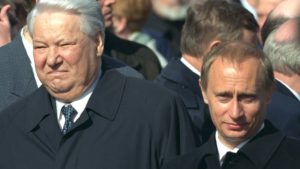
Then, Lady Luck struck! He was offered to move to Moscow and take up legal affairs in the presidential administration. He took the job. Pretty soon he was moving up the political ladder. He went to work for then-President Boris Yeltsin, who was ailing at that time. Consequently Yeltsin appointed him Prime Minister in August 1999. It was a clear sign that Yeltsin was preparing Putin for the Kremlin. Yeltsin was not due to leave office for another year, but in December 1999 he took the surprise decision to go early. On December 31, 1999, Yeltsin resigned and appointed Putin – who was virtually unknown – as acting president. Three months later he was elected President of Russia.
Rise to power
He has been in power since 2000. He made no secret of his determination to reassert Russian power after years of perceived humiliation by the U.S. and its NATO allies. He resented NATO’s expansion up to Russia’s borders.
It did not then come as a surprise that Russia’s new build-up of troops around Ukraine has rekindled Western suspicion of Putin. The West also accused Putin of helping pro-Russian rebels in eastern Ukraine with heavy weapons and troops. Although he insisted that only Russian “volunteers” had gone there to help.
Putin will never forget the “coup” that forced Ukraine’s then-President Viktor Yanukovych to flee to Russia in 2014. Russia then attacked Crimea with its “Little Green Men,” who are masked soldiers in unmarked green army uniforms. Russia eventually annexed Crimea that caused the Group of Eight — G8 — to expel Russia from the group, which is now called G7.
Russian demands
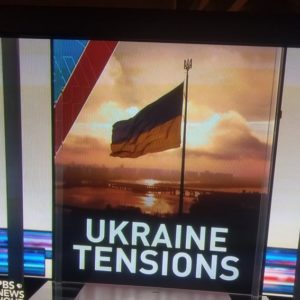 With more than 100,000 Russian troops poised to invade Ukraine, Putin demanded that the West “immediately” guarantee that NATO will not expand to include Ukraine. He blamed the U.S. for inflaming tensions in Eastern Europe and the likelihood of war.
With more than 100,000 Russian troops poised to invade Ukraine, Putin demanded that the West “immediately” guarantee that NATO will not expand to include Ukraine. He blamed the U.S. for inflaming tensions in Eastern Europe and the likelihood of war.
Russia also demanded that NATO withdraw its forces, hardware, and arms from countries that were not NATO members before 1997 as part of security demands it is seeking from NATO.
Whoa! Does that mean that NATO will pull out of the following 14 former Soviet bloc countries: Albania, Bulgaria, Croatia, Czech Republic, Estonia, Hungary, Latvia, Lithuania, Montenegro, North Macedonia, Poland, Romania, Slovakia, and Slovenia? Heck that’s about half the membership of NATO!
Russia also demanded that the U.S. must pledge to “bar entry to NATO for ex-Soviet states such as Ukraine and Georgia and refuse to make use of their military infrastructure or develop bilateral defense ties with them,” the security demands said.
Russia also demanded that the U.S. must also “agree not to fly heavy bombers armed with nuclear or non-nuclear weapons or deploy warships ‘outside national airspace and national territorial waters’ if they could be used to attack another country,” the document said.
NATO swiftly rejected Russia’s demands the same day, with a spokeswoman saying that such a move would create first- and second-class alliance members. The question is: Does Putin think that NATO would ever withdraw its troops from NATO’s frontline countries?
Biden’s withdrawal
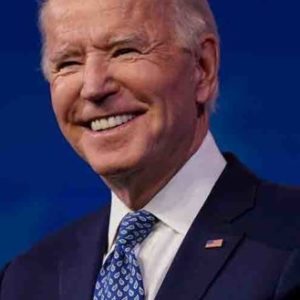
But President Biden, who would withdraw or surrender NATO territory to Russia at the slightest provocation, is clearly a sign that he is up to his old trick of withdrawing troops like what he did in Afghanistan.
In a recent video chat with Putin over the situation in Ukraine, details of the conversation have emerged: “Administration officials have suggested that the U.S. will press Ukraine to formally cede a measure of autonomy within its eastern Donbas region, which is now under de facto control by Russia-backed separatists who rose up against Kyiv in 2014.”
Lately, Biden refused Russia’s demand that NATO will never admit Ukraine into NATO, the fact of the matter is: NATO will never admit Ukraine into NATO, while Putin is in power and the Russian “volunteers” are still in Donbas.
Biden said that he thinks Russia will attack Ukraine but he warned that Moscow would face a “stiff price.” He also said that Russia would prevail militarily in an invasion but would suffer heavy casualties. He then said that NATO was divided on how to respond if there is only a “minor incursion.” One Ukrainian official told CNN it “gives the green light to Putin to enter Ukraine at his pleasure.”
Immediately, NATO allies criticized Biden for saying that. Biden then clarified, saying, “Any Russian troop movement into Ukraine would be considered an invasion.” He also said that if Russia invades Ukraine, “it is going to be a disaster,” and the U.S. and its allies would respond with measures including economic sanctions.
It amazes me to hear Biden say that Russia would “prevail militarily in an invasion.” Has he surrendered before the Russians invade Ukraine? My God! That’s defeatism! And coming from the U.S. Commander-in-Chief, it would surely encourage Putin to invade.
One needs to remember Putin’s favorite strategy, which is: “If a fight is inevitable you have to throw the first punch.”
Yes, Putin’s punch is coming!
(PerryDiaz@gmail.com)




Leave a Reply